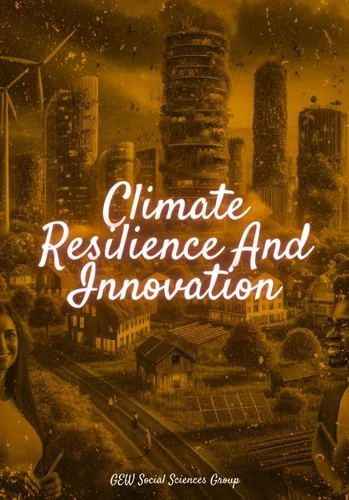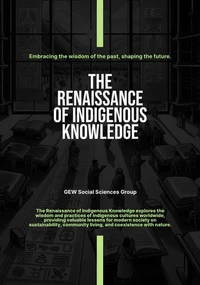Climate Resilience And Innovation
Par :Formats :
Disponible dans votre compte client Decitre ou Furet du Nord dès validation de votre commande. Le format ePub protégé est :
- Compatible avec une lecture sur My Vivlio (smartphone, tablette, ordinateur)
- Compatible avec une lecture sur liseuses Vivlio
- Pour les liseuses autres que Vivlio, vous devez utiliser le logiciel Adobe Digital Edition. Non compatible avec la lecture sur les liseuses Kindle, Remarkable et Sony
- Non compatible avec un achat hors France métropolitaine
 , qui est-ce ?
, qui est-ce ?Notre partenaire de plateforme de lecture numérique où vous retrouverez l'ensemble de vos ebooks gratuitement
Pour en savoir plus sur nos ebooks, consultez notre aide en ligne ici
- FormatePub
- ISBN8227276216
- EAN9798227276216
- Date de parution31/05/2024
- Protection num.Adobe DRM
- Infos supplémentairesepub
- ÉditeurBig Dog Books, LLC
Résumé
"Climate Resilience And Innovation " extensively explores the interplay between climate resilience and innovation, emphasizing the importance of nature-based solutions, advanced technologies, community engagement, and global cooperation to build sustainable, resilient communities capable of addressing the challenges posed by climate change. The driving idea behind the book is to examine specific areas of focus related to building a more sustainable and resilient future, offering in-depth insights and practical recommendations.
Each chapter delves into different aspects such as climate technology, the science of climate change, climate-resilient infrastructure, sustainable transportation, and renewable energy innovations, aiming to provide comprehensive knowledge and actionable solutions for mitigating the impacts of climate change. Key Takeaways:- **Nature-Based Solutions (NBS)**: Utilizing natural processes and ecosystems to enhance climate resilience and provide multiple environmental and socio-economic benefits.- **Technology and Innovation**: Emphasizing advancements in carbon capture, energy efficiency, and intelligent climate prediction models alongside renewable energy integration and climate-resilient infrastructure.- **Community Engagement**: Highlighting the importance of local leadership, stakeholder collaboration, education, and participatory decision-making in fostering climate resilience.- **Global Collaboration**: Stressed the need for international agreements, multinational corporate involvement, technology exchange, financial mechanisms, and overcoming cultural differences to address climate challenges.- **Successful Case Studies**: Detailed examples of innovative climate actions in urban renewal, agriculture, water management, transportation, and conservation showing real-world applications and outcomes.- **Monitoring and Evaluation**: Importance of rigorous methods to assess the effectiveness and sustainability of climate initiatives, underpinned by adaptive management.- **Strategic Recommendations**: Advocated for strengthening international dialogue, investment in technology transfer, financial alignment, performance tracking, and inclusive global cooperation for resilient futures.
Each chapter delves into different aspects such as climate technology, the science of climate change, climate-resilient infrastructure, sustainable transportation, and renewable energy innovations, aiming to provide comprehensive knowledge and actionable solutions for mitigating the impacts of climate change. Key Takeaways:- **Nature-Based Solutions (NBS)**: Utilizing natural processes and ecosystems to enhance climate resilience and provide multiple environmental and socio-economic benefits.- **Technology and Innovation**: Emphasizing advancements in carbon capture, energy efficiency, and intelligent climate prediction models alongside renewable energy integration and climate-resilient infrastructure.- **Community Engagement**: Highlighting the importance of local leadership, stakeholder collaboration, education, and participatory decision-making in fostering climate resilience.- **Global Collaboration**: Stressed the need for international agreements, multinational corporate involvement, technology exchange, financial mechanisms, and overcoming cultural differences to address climate challenges.- **Successful Case Studies**: Detailed examples of innovative climate actions in urban renewal, agriculture, water management, transportation, and conservation showing real-world applications and outcomes.- **Monitoring and Evaluation**: Importance of rigorous methods to assess the effectiveness and sustainability of climate initiatives, underpinned by adaptive management.- **Strategic Recommendations**: Advocated for strengthening international dialogue, investment in technology transfer, financial alignment, performance tracking, and inclusive global cooperation for resilient futures.
"Climate Resilience And Innovation " extensively explores the interplay between climate resilience and innovation, emphasizing the importance of nature-based solutions, advanced technologies, community engagement, and global cooperation to build sustainable, resilient communities capable of addressing the challenges posed by climate change. The driving idea behind the book is to examine specific areas of focus related to building a more sustainable and resilient future, offering in-depth insights and practical recommendations.
Each chapter delves into different aspects such as climate technology, the science of climate change, climate-resilient infrastructure, sustainable transportation, and renewable energy innovations, aiming to provide comprehensive knowledge and actionable solutions for mitigating the impacts of climate change. Key Takeaways:- **Nature-Based Solutions (NBS)**: Utilizing natural processes and ecosystems to enhance climate resilience and provide multiple environmental and socio-economic benefits.- **Technology and Innovation**: Emphasizing advancements in carbon capture, energy efficiency, and intelligent climate prediction models alongside renewable energy integration and climate-resilient infrastructure.- **Community Engagement**: Highlighting the importance of local leadership, stakeholder collaboration, education, and participatory decision-making in fostering climate resilience.- **Global Collaboration**: Stressed the need for international agreements, multinational corporate involvement, technology exchange, financial mechanisms, and overcoming cultural differences to address climate challenges.- **Successful Case Studies**: Detailed examples of innovative climate actions in urban renewal, agriculture, water management, transportation, and conservation showing real-world applications and outcomes.- **Monitoring and Evaluation**: Importance of rigorous methods to assess the effectiveness and sustainability of climate initiatives, underpinned by adaptive management.- **Strategic Recommendations**: Advocated for strengthening international dialogue, investment in technology transfer, financial alignment, performance tracking, and inclusive global cooperation for resilient futures.
Each chapter delves into different aspects such as climate technology, the science of climate change, climate-resilient infrastructure, sustainable transportation, and renewable energy innovations, aiming to provide comprehensive knowledge and actionable solutions for mitigating the impacts of climate change. Key Takeaways:- **Nature-Based Solutions (NBS)**: Utilizing natural processes and ecosystems to enhance climate resilience and provide multiple environmental and socio-economic benefits.- **Technology and Innovation**: Emphasizing advancements in carbon capture, energy efficiency, and intelligent climate prediction models alongside renewable energy integration and climate-resilient infrastructure.- **Community Engagement**: Highlighting the importance of local leadership, stakeholder collaboration, education, and participatory decision-making in fostering climate resilience.- **Global Collaboration**: Stressed the need for international agreements, multinational corporate involvement, technology exchange, financial mechanisms, and overcoming cultural differences to address climate challenges.- **Successful Case Studies**: Detailed examples of innovative climate actions in urban renewal, agriculture, water management, transportation, and conservation showing real-world applications and outcomes.- **Monitoring and Evaluation**: Importance of rigorous methods to assess the effectiveness and sustainability of climate initiatives, underpinned by adaptive management.- **Strategic Recommendations**: Advocated for strengthening international dialogue, investment in technology transfer, financial alignment, performance tracking, and inclusive global cooperation for resilient futures.

















